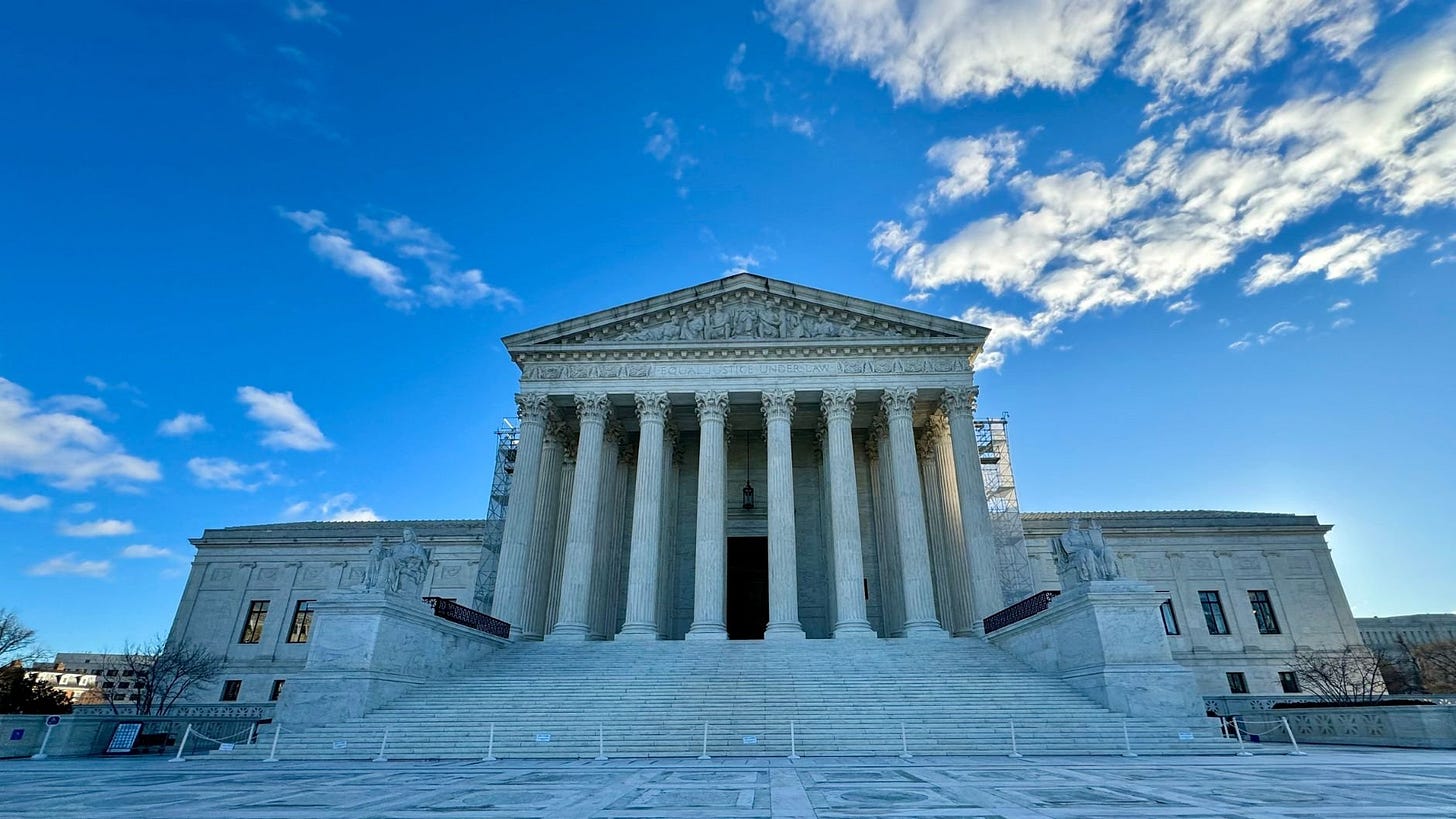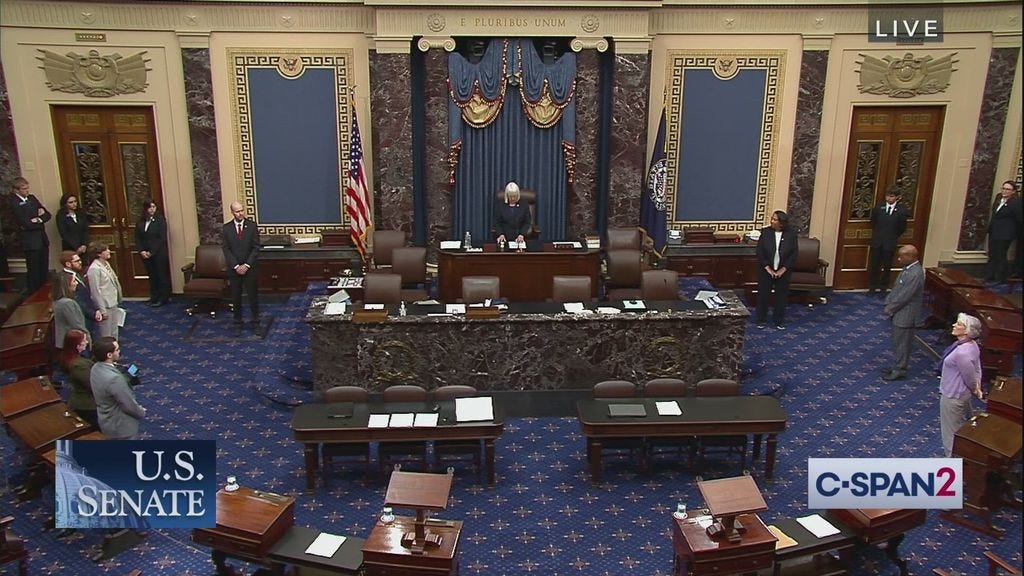Today is February 8, 2024, and here are the critical stories that you may have missed from today. If you enjoy this content and want access to more, exclusive content or to support my work, then consider becoming a monthly subscriber below:
1) The Supreme Court Considers Removing Trump From The Ballot
This morning, the Supreme Court heard argument in Trump v. Anderson, a case that could see Donald Trump be removed off of the Presidential primary ballot. Previously, the Colorado Supreme Court held that Trump violated the 14th Amendment’s insurrection clause and therefore could not remain on the state’s presidential ballot. During oral argument today, however, the Supreme Court Justices appeared skeptical of the Colorado decision leading many to believe that they will overturn the decision and will allow Trump to remain on the ballot. Here is a great breakdown of what happened in Court today and what to expect next.
2) FCC Declares AI Generated Robocalls Illegal
Today, the Federal Communications Commission issued a decision declaring AI generated robocalls illegal. The Commission determined that these AI-generated voices violate the Telephone Consumer Protection Act which restricts the use of junk calls and comes as New Hampshire officials have launched an investigation into an AI-generated robocall that advised voters against voting in the state's presidential primary last month. The investigation into the source of the robocall has thus far not yielded many results, but, according to New Hampshire's Attorney General, has linked the calls to a pair of Texas telecommunications companies.
In today's ruling, the chair of the FCC noted that bad actors use the AI generation as a way to spread misinformation in elections, thereby harming the American public. Additionally, the ruling classifies these AI-generated robocalls as "artificial" meaning they could be regulated under the same standards typical robocalls made by telemarketers are. Under the new rules, those who break the law could face the possibility of significant fines, maxing out at over $20,000 per call made. The agency has also given those who receive these calls an avenue to take legal action and recover up to $1,500 in damages for each call received.
This ruling will have a significant impact heading into the 2024 election where many across the country have grown increasingly concerned with the use of AI as a way to spread misinformation about the candidates or issues this election cycle.
3) Senate Republicans Buck Trump And Join Democrats to Advance Aid Bill For Ukraine, Israel and Taiwan
The United States Senate has advanced a stand alone bill that would provide significant funding for both Ukraine and Israel, bucking Donald Trump and other far-right Republicans.
All Democrats voted in support of the bill, while seventeen Republicans voted in support of the bill, including Senate Minority Leader Mitch McConnell. The bill would provide a total of $95.3 billion in aid to Ukraine, Israel, and Taiwan, helping America's allies overseas. The full vote was 67 in support and 32 against.
With more than 60 votes, the Senate has broken the filibuster and will begin debate on the clean foreign aid package.
It remains unclear whether or not all of the Republican senators will vote for the bill's final passage.
This bill comes days after House Republicans tried to remove Ukraine funding from any legislation and failed to pass a standalone Israel aid bill. If the bill successfully makes it through the Senate, it will move to the House of Representatives, which is a larger hurdle as House Republicans have signaled that they will not support any additional aid package that includes Ukraine. Time will tell whether some Republicans have the courage in the House to join Democrats and pass the bill.
4)Judge Declines Peter Navarro's Request To Remain Out Of Jail Pending Appeal
Judge Amit Mehta has denied former Trump official Peter Navarro's request to remain out of jail pending an appeal of his conviction of contempt of congress charges. Previously, a jury of his peers convicted Navarro of both counts of contempt of congress and Judge Mehta ordered Navarro to serve four months in federal prison. Following the conviction, Navarro asked the Judge to remain out of jail pending his appeal of the convictions. Judge Mehta requested additional briefing from his counsel.
After supplemental briefing was filed by Navarro's counsel concerning the issue of release pending appeal, Judge Mehta has ruled that none of the issues raised by Navarro constitute a substantial question of law that would make an appeal likely to be successful. In denying Navarro's request, Judge Mehta called out Navarro's claim that the prosecution of him was politically motivated. Specifically, Judge Mehta stated:
"Defendant’s cynical, self-serving claim of political bias poses no question at all, let alone a 'substantial' one."
As a result, Judge Mehta denied Navarro's request, ordering him to report to prison. This opinion is different from that of Steve Bannon's where Bannon has been allowed to remain out of prison pending an appeal of his conviction. Navarro will now likely appeal this decision to the D.C. Circuit, but will have to report to prison pending the appellate court's decision.
5) Judge Denies Trump's Request For A Mistrial In E. Jean Carroll Case
Judge Lewis Kaplan has officially denied Donald Trump's motion for a mistrial, submitting a written order following his oral denial during the trial declaring Trump's motion to be "without merit." Trump's attorneys previously argued for a mistrial, arguing that one was warranted after E. Jean Carroll said she deleted certain emails and Twitter messages that contained death threats.
During the cross examination of Carroll, Trump's attorney Alina Habba asked Carroll about several of these messages, eliciting testimony that she deleted some of them. Carroll's attorneys later responded to the mistrial motion arguing that Habba and her team had knowledge of the deleted messages one year prior to trial, yet failed to raise the issue with the court.
Judge Kaplan, in his written opinion, asserted that the failure of Trump's attorneys to raise the issue when they were informed one year prior to trial was one reason for the denial of the mistrial. In addition, Trump's attorneys failed to list which messages were deleted or when.
Moreover, and perhaps most importantly, the messages would not have impacted Trump's case at trial. Judge Kaplan wrote that it was unclear how in any way that the threatening messages would have helped Trump's case. Because Trump's attorneys were unable to demonstrate any prejudice from the missing messages or emails, the court denied the motion.





